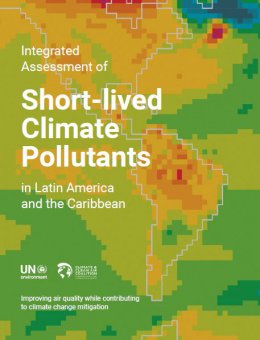Integrated assessment of short-lived climate pollutants in Latin America and the Caribbean
 Efforts to reduce dangerous air and climate pollutants by Latin American and Caribbean countries could reap immediate and long-term benefits for health, food security and the climate according to the first ever Integrated Assessment of Short-lived Climate Pollutants (SLCPs) for the region. Short-lived climate pollutants – which include black carbon (or soot), methane, ground level (tropospheric) ozone, and hydrofluorocarbons (HFCs) – all have a global warming potential hundreds to thousands times that of carbon dioxide. Black carbon and ozone also seriously impact human and plant health. The assessment, developed by 90 authors and led by experts from the region was released by the United Nations Environment Programme (UN Environment) and the Climate and Clean Air Coalition (CCAC). It found poor air quality and climate change is already affecting vulnerable populations and environment in the region resulting in premature deaths, crop yield losses, and ecosystem damage.
Efforts to reduce dangerous air and climate pollutants by Latin American and Caribbean countries could reap immediate and long-term benefits for health, food security and the climate according to the first ever Integrated Assessment of Short-lived Climate Pollutants (SLCPs) for the region. Short-lived climate pollutants – which include black carbon (or soot), methane, ground level (tropospheric) ozone, and hydrofluorocarbons (HFCs) – all have a global warming potential hundreds to thousands times that of carbon dioxide. Black carbon and ozone also seriously impact human and plant health. The assessment, developed by 90 authors and led by experts from the region was released by the United Nations Environment Programme (UN Environment) and the Climate and Clean Air Coalition (CCAC). It found poor air quality and climate change is already affecting vulnerable populations and environment in the region resulting in premature deaths, crop yield losses, and ecosystem damage.
